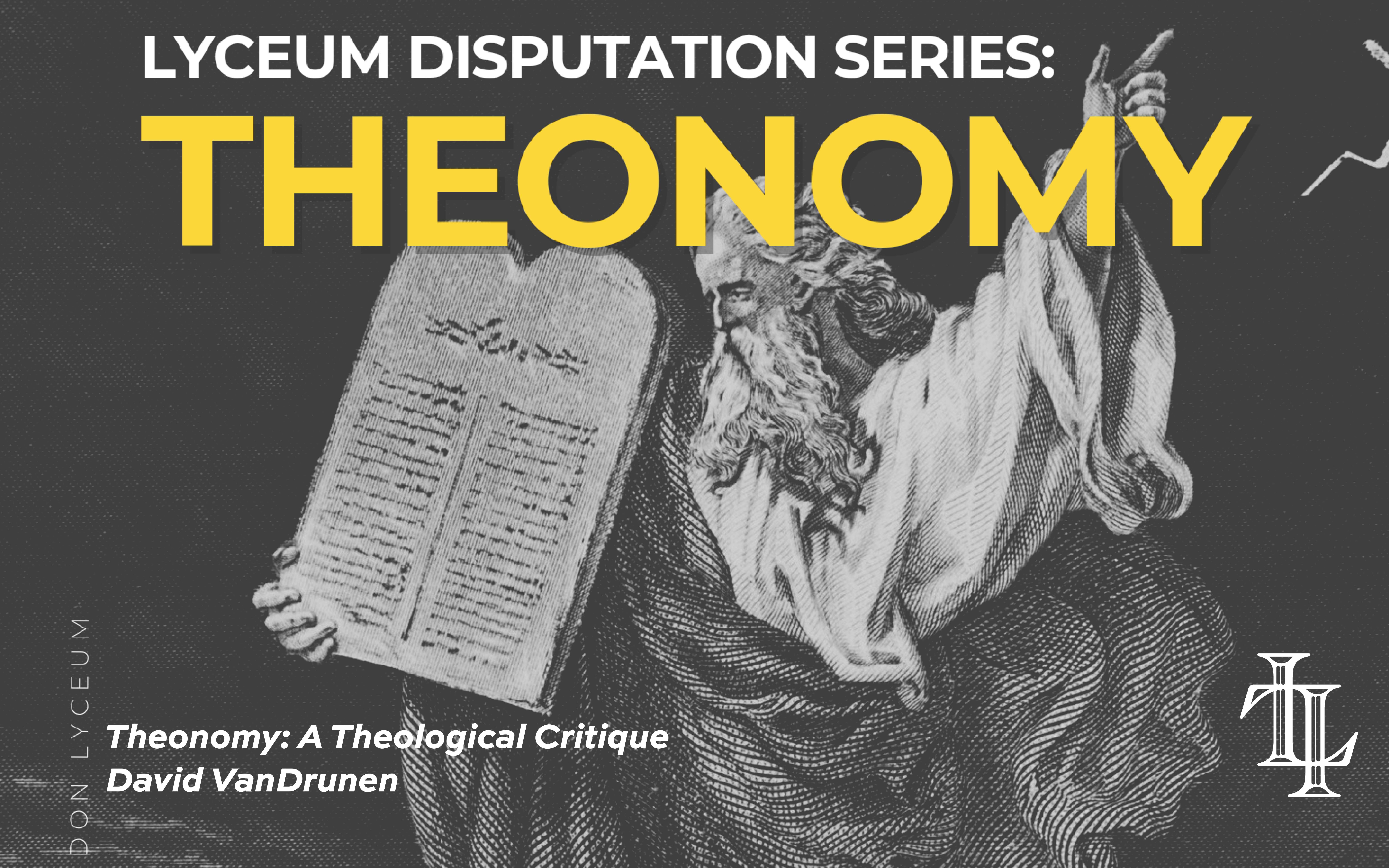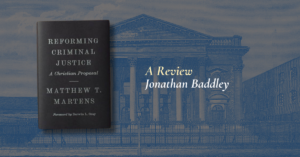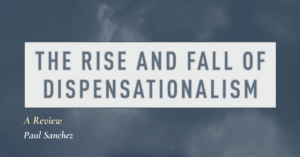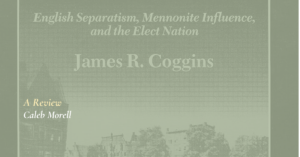Editor’s Note: This is part 3 in our Lyceum Disputation series considering the nature and validity of theonomy. Stay tuned for further installments. As with all our work, the London Lyceum publishes a range of viewpoints to encourage thinking.
Theonomy, as I engage it here, refers to the conviction that the so-called judicial (or civil) laws of Moses are normative for political communities today. That is, in distinction from the Mosaic ceremonial laws, which Christ fulfilled in such a way that Christians no longer observe them, God revealed the judicial laws as the righteous standard for all civil governments and legal systems. Perhaps some readers have a different understanding of “theonomy,” but this is the one with which I’m most familiar.[1]
I argue that Christians should reject theonomy. Classical Reformed theology and the earlier Christian tradition repudiated such a view of the Mosaic law, such a view is inconsistent with biblical teaching, and a favorable view of theonomy stands in tension with the sort of spirituality Scripture encourages new-covenant Christians to pursue.
Classical Reformed Statements on the Mosaic Judicial Laws
While the bulk of this essay focuses on biblical material, it’s important to recognize theonomy’s poor historical pedigree. I begin by discussing briefly my own Reformed tradition and then also mention an important theologian of the earlier Christian tradition.
The Westminster Confession of Faith, still a doctrinal standard for confessional Presbyterians worldwide, presents a summary of theology as broadly understood in the classical Reformed Christianity that was coming to maturity in the mid-seventeenth century. Chapter 19 distinguishes the “moral,” “ceremonial,” and “judicial” laws within the Mosaic law (19.2-4). It states that to Israel, “as a body politic, he [God] gave sundry judicial laws, which expired together with the State of that people; not obliging any other now, further than the general equity thereof may require” (19.4). Thus the primary thing it confesses about the judicial laws is that they’ve expired, which is directly opposite of what the theonomic position affirms. The reason why they expired is because Israel received them “as a body politic” and this body politic—“the State of that people”—no longer exists. When a commonwealth expires, so too does its laws. What obligates us now in the judicial laws is only their “general equity” (general principles of justice).
As we’d expect, this was the widespread view of early Reformed theologians. They often considered the possibility of holding a view of the Mosaic judicial laws similar to today’s “theonomic” position, and they rejected it. When discussing the Mosaic law, John Calvin (1509-1564) distinguishes between “the enactment of the law, and the equity on which the enactment is founded and rests.” “The whole of this equity,” he writes, is prescribed in the “natural law.” He goes on to explain that it’s this equity of the natural law that all civil law must observe, but this properly takes different forms in different places. With respect to the Mosaic judicial law, “The Lord did not deliver it by the hand of Moses to be promulgated in all countries, and to be everywhere enforced….”[2]
A prominent early Reformed scholastic theologian, Franciscus Junius (1545-1602), advocated a similar view. In the preface to a work on the Mosaic law, he notes that the holy and wise fathers of the early church taught “that those judicial commandments are neither absolutely necessary for the state nor apply to it and its function.” But he then mentions a theonomy-like movement in his own time: “In these last days people have emerged with a zeal for piety, truth, and doing righteousness who contend that it is necessary that their use be reintegrated into the Christian state and that by divine authority we are obligated to observe them.” He states that this is a zeal without knowledge.[3] Accordingly, in the main part of this work, he recognizes the divine origin of the judicial laws yet explains that “the substance of those things is mutable in itself, and truly the form of the public laws was established by God according to the mode of those things at that time, not forever….”[4]
It’s similar for one of the great jurists among early Reformed Christians, Johannes Althusius (1563-1638). He distinguishes the “moral (or common), ceremonial, and forensic [judicial]” laws of Moses. “What is judicial,” he notes, “can be changed by the change of circumstances….”[5] The civil magistrate should thus conform his commonwealth’s laws to the Mosaic law “so far as moral equity or common law are expressed therein,” but “he is by no means required to conform in those things in which the proper law of Moses, in order to be accommodated to the polity of the Jews, differs from common law. For if the magistrate should establish as absolutely necessary these proper Jewish laws, which by their nature are either changeable or obsolete, he would destroy Christian liberty…. Thereby he would make a necessity of something free, and impede consciences by a grievous and dangerous snare.”[6]
Finally, the eminent Reformed scholastic Francis Turretin (1623-1687) pointed in the same direction. He identifies a view of the Mosaic judicial laws that “wander[s] from the truth” in holding that these laws “are still in force and should be retained and that Christian states are to be governed like the Jewish….”[7] Instead, he argues that the judicial laws “accommodated to the genius and reason of the Jewish polity were not only made useless to Christians living under a different polity, but neither can, nor ought to be observed any longer…. The polity having been abolished, the laws must necessarily be abolished upon which that polity was founded.” He concludes this discussion by claiming that “when the Roman laws are preferred to the Mosaic, they are not preferred simply as enacted by men, but as derived from natural and common right they can be more suitable to places, times, and persons.”[8]
This perspective wasn’t new to the Reformation. For example, the most influential of medieval theologians, Thomas Aquinas, held a position virtually indistinguishable from the later Reformed. He asked “whether the judicial precepts of the old law bind forever” and answered in the negative. He explains that the judicial precepts were instituted “that they might shape the state of that people who were directed to Christ. Consequently, when the state of that people changed with the coming of Christ, the judicial precepts lost their binding force….” Although it’s not necessarily wrong to observe judicial precepts today, a person must not do so “as though one were bound by the Law…because it would follow that the former state of the people still lasts, and that Christ has not yet come.”[9]
Theonomy and Scripture
Scripture strongly supports these earlier theologians. I believe there is one simple reason why theonomy is mistaken: God gave the Mosaic law as part of the Mosaic covenant, and thus he designed the judicial laws as a righteous standard for the civil life of old-covenant Israel, a community unique in all of history. This old-covenant community no longer exists, and no other community today is like it or could be like it. Laws perfectly designed for one community are not binding on other communities, especially on communities of a fundamentally different nature.
That God gave the Mosaic law as part of the Mosaic covenant is quite clear. In Exodus 19, God assembles Israel at Mount Sinai and declares his covenant with them (19:5). He then proceeds to deliver the Ten Commandments (20:1-17), followed shortly thereafter by the “Covenant Code” (20:23-23:19), which contains a great number of judicial laws. Exodus 24 then narrates the covenant ratification ceremonies, in which Moses tells the people God’s rules (24:3), records them (24:4), reads the “Book of the Covenant” (24:7), and throws the “blood of the covenant” on the people (24:8). The law’s regulations continue in subsequent chapters and books. Deuteronomy presents a restatement of the Mosaic law, as part of God’s renewal of his covenant with Israel, on the plains of Moab (29:1-29).
This old covenant no longer exists. The Mosaic law itself foretold that Israel would be unfaithful to it and that a new initiative of God’s grace would be necessary (Deut 30:1-3). The prophets described the Mosaic covenant as broken and thus announced the coming of a new covenant (e.g., Jer 31:31-34). When Jesus the Messiah came, the old-covenant people rejected him and he established the new covenant in his blood (e.g., Matt 26:28). This is a “better” covenant (Heb 8:6) that makes the old covenant “obsolete” (8:13).
Because the old-covenant community no longer exists, the laws regulating its civil community are no longer binding as such. We understand how this works from ordinary experience. I’m a citizen and resident of the United States, but I’m writing this from Europe. American law isn’t obligatory here. Laws of the United States, no matter how wonderful they may be for that country, aren’t binding in other countries. If the United States were dissolved, the American constitution would cease to be obligatory even within the geographical bounds of what we now know as the United States.
These considerations indicate the basic reason why theonomy is wrong. The political community to which God gave the Mosaic judicial laws hasn’t existed for two millennia.
Now, one might object that though old-covenant Israel no longer exists God gave the Mosaic judicial laws with the intention that they should serve as the normative standard for all political communities. This may have initial plausibility since Christians agree that at least some Mosaic laws (e.g., “Do not commit adultery,” “Do not steal”) are obligatory for all human beings. But this objection doesn’t hold.
For one thing, it’s worth noting that Scripture itself never says in any direct way that Mosaic judicial laws bind any political community other than ancient Israel. The Mosaic law itself never says it, the Old Testament prophets never condemned Gentile nations for violating these laws, and the New Testament says nothing about political communities in this present age being obligated to enforce them. The most theonomy can possibly claim is that the indirect teaching of Scripture indicates that God gave the judicial laws as a standard for all nations.
But Scripture points in exactly the opposite direction. Israel was unique. When God announced his covenant with Israel, he said that though “all the earth is mine,” Israel would be “my treasured possession among all peoples” (Exod 19:5). A crucial aspect of God’s unique relationship with Israel was that they were a “holy nation” and thus a “kingdom of priests” (19:6). Such privileges were the result of God’s redemptive grace, for this alone can make fallen sinners into a holy community and bestow true priesthood upon them. And this holiness was a pervasive concern in Israel’s judicial laws. Even in the Covenant Code we find not only penalties and remedies for harm to person and property but also capital punishment for sorcery (22:18), sacrifices to false gods (22:20), and blasphemy (22:28). God was bringing Israel into a special land from which all Gentile nations were to be forcibly expunged (23:20-23). Israel was to bear the sword against them, and against its own people as necessary, in order to keep all devotion of false gods out of this land and thus to maintain thorough holiness within its borders. Trying to maintain the judicial laws apart from this concern for pervasive holiness uses these laws in a way completely foreign to the biblical text itself. And no other nation was holy or could have been holy, because God had entered a redemptive covenant with none of them. The Mosaic judicial laws, as such, were unfitting for such nations.
The same is true today. The New Testament picks up the language of Exodus 19:5-6 and declares that there is now also a “royal priesthood” and “holy nation” that is God’s “own possession” (1 Pet 2:9). But Peter makes clear that this is the church, God’s “elect” people (1:1), his “spiritual house” (2:5), a people who have received mercy and live in the world as “sojourners and exiles” (2:10-11). The New Testament never applies this to political communities. They aren’t holy and have no priesthood, no matter how many Christians may be living within them, because God hasn’t entered the new covenant with them as he has with his church. And no non-holy community can enter a redemptive covenant with God on its own initiative; to attempt this is a strange sort of Pelagianism. Thus, the Mosaic judicial laws, as such, divinely intended to govern and protect a holy community, are unfitting for any community today. They’re unfitting for the church since the church doesn’t bear the sword, and they’re unfitting for political communities because they’re not holy.
It should be clear that none of this implies that contemporary civil laws can’t resemble individual Mosaic judicial laws or that people can’t gain insight about justice from them. The “general equity” clause of Westminster Confession 19.4 wisely suggests otherwise. But the vast difference between holy and non-holy communities means that the Mosaic judicial laws themselves can never be our legal standard.
Two other objections are related to each other and can be considered more briefly. First, if the Mosaic judicial laws aren’t the standard for contemporary civil law, and since the New Testament obviously doesn’t provide civil laws, doesn’t this leave our political communities without a normative divine standard and thus make them morally autonomous? The answer is no: All people know the basic obligations of justice through God’s natural revelation and are thereby accountable to him for their political activity. Romans teaches that all people know God from the things he’s made and are thus without excuse for failing to honor him (1:19-23), and all people also understand their accountability before God for a range of other immoral behavior (1:24-32). Such natural knowledge of God and his law surely extends to the basic demands of intra-human justice in civil community. This is evident in Genesis 20, where the Gentile Abimelech understood that there are “things that ought not to be done” (20:9), even between those of different people groups, and he rebuked Abraham accordingly. This is also evident in Amos 1:2-2:3, where God condemns six Gentile nations for what we might today call crimes against humanity, including treaty-breaking (1:9) and ripping open pregnant women (1:13). They didn’t have the Mosaic law, but God held them accountable through their natural knowledge. It’s interesting that Amos doesn’t refer to the (Mosaic) law until 2:4, when he condemns Judah.
The other objection is that a non-theonomic view compromises the sufficiency of Scripture. But this is simply not the case. The Reformation doctrine of biblical sufficiency never meant that Scripture gives us comprehensive guidance in every area of life. If biblical sufficiency isn’t compromised by the fact that Scripture provides no detailed instruction for how to teach geometry, grow corn, or play the violin, lack of detailed instruction about contemporary civil law doesn’t compromise it either. Natural and special revelation give us what they give us. In all these activities, we should use our minds, learn from others, and reflect on our experience to figure out how to do them as excellently as we can. This also implies that there’s no single right or Christian way to view political matters. As there’s surely room for Christians to debate and disagree about how best to teach geometry or grow corn, without breaking fellowship in Christ, so too with matters of law and politics.
Theonomy and Christian Spirituality
To conclude, I wish to suggest that the piety or spirituality of new-covenant Christianity runs at cross-currents to theonomy. That is, I believe that understanding and pursuing the Christian life is much more coherent when rejecting theonomy than when embracing it. I mention four matters briefly.
First, new-covenant Christianity is fundamentally evangelistic. It looks upon unbelievers not as people to be punished or eliminated here and now, but as those with whom we should seek to live in peaceful co-existence (Rom 12:18; 1 Cor 5:10), with the ultimate goal that they join us in the church as disciples of Christ (Matt 28:19-20). The new-covenant church promotes and protects holiness by calling sinners to faith and exercising ecclesiastical discipline. This New Testament approach is simply different from the Mosaic judicial laws that view unbelievers primarily as those to be punished and destroyed.
Second, new-covenant Christianity is characterized by suffering now and glory later. After Peter’s confession of Jesus as Messiah and Jesus’s promise to build his church, the first thing Jesus taught is that his people must follow his pattern of suffering and then resurrection (Matt 16:13-28). Of course, Peter found this offensive and we Christians today often find ourselves inclined to agree. But there’s no other way to follow Jesus than to deny oneself and take up one’s cross. In contrast, it’s difficult to see how promoting enforcement of the Mosaic judicial laws isn’t a quest for glory now. It aims to create holy societies in which Christians and Christianity would be honored above others and suffering for Christ’s sake drastically reduced. This is naturally attractive to us, but we should remember Jesus’s response to Peter when Peter objected to the suffering-then-resurrection pattern (Matt 16:23).
Third, new-covenant Christianity doesn’t seek political power but seeks to serve others humbly. Again, this follows Jesus’s own pattern. Two disciples, James and John, saw devotion to Jesus as a means to gain authority over others (Mark 10:35-37). The other disciples apparently sought the same thing (10:41). Jesus thus taught them not to be like the Gentile rulers who delight to “lord it over” and “exercise authority” over others, but instead to be servants and even slaves of all (10:42-44). To do so follows the example of Jesus, who came not to be served but to serve, and to give his life a ransom for many (10:45). There’s nothing wrong with Christians holding government office. This is one valid vocation among many. But it’s difficult to see how a consistent theonomic position wouldn’t require Christians to seek political dominance over others, which is the only conceivable way the Mosaic judicial laws could be implemented. Theonomists might respond that they seek to serve as Christ commanded through political authority. But it’s a sobering reminder to us all that Jesus said we should make ourselves slaves to all rather than strive for authority over them.
Finally, as noted above, the New Testament identifies Christians as sojourners and exiles (1 Pet 2:11). Because we’re citizens of heaven (Phil 3:20), we have no lasting city here but await the city to come (Heb 13:14). As the sojourner Abraham moved from place to place, so Christian sojourners should never expect to feel settled in their earthly communities. As the exile Daniel served as a high government official in Babylon but longed for return to Jerusalem (Dan 9), so Christian exiles contribute productively to their political communities while earnestly praying “Come, Lord Jesus” (Rev 22:20; cf. 1 Cor 16:22). In contrast, theonomy makes it the Christian mission, in effect, to make ourselves feel at home in this world—more settled, more comfortable. It’s understandable that Christians are tempted to find this attractive, but it’s not how the New Testament trains our hearts. As a character in a novel I’m now reading puts it, “A woman who has met a splendid man finds a good man ludicrous.”[10] Some Christians consider it a good thing for contemporary nations to enforce the Mosaic judicial laws, but it seems ludicrous in comparison to the splendor of the Jerusalem above, our mother (Gal 4:26). Christians should never really feel at home while away from her.
[1] E.g., see Greg L. Bahnsen, Theonomy in Christian Ethics (Nutley, NJ: Craig, 1977). He says that the Mosaic law “is to be enforced by the civil magistrate where and how the stipulations of God so designate” (34). One of his major arguments is from Matthew 5:17, which I won’t engage here. But see David VanDrunen, “Jesus Came ‘Not to Abolish the Law but to Fulfill It’: The Sermon on the Mount and Its Implications for Contemporary Law,” Pepperdine Law Review 47 (Special Issue, 2020): 523-48.
[2] John Calvin, Institutes of the Christian Religion, 4.20.16. English translation from Institutes of the Christian Religion, 2 vols., trans. Henry Beveridge (Grand Rapids: Eerdmans, 1953).
[3] Franciscus Junius, The Mosaic Polity, trans. Todd M. Rester, ed. Andrew M. McGinnis (Grand Rapids: Christian’s Library Press, 2015), 19
[4] Junius, The Mosaic Polity, 69.
[5] Johannes Althusius, Politica (Politics Methodically Set Forth and Illustrated with Sacred and Profane Examples), trans. and ed. Frederick S. Carney (Boston: Beacon, 1964; Indianapolis: Liberty Fund, 1995), 146.
[6] Althusius, Politica, 148.
[7] Francis Turretin, Institutes of Elenctic Theology, 3 vols., trans. George Musgrave Giger, ed. James T. Dennison, Jr. (Phillipsburg, NJ: P&R, 1992-1997), 2.166.
[8] Turretin, Institutes, 2.167.
[9] Thomas Aquinas, Summa Theologiae, 1a2ae 104.3. English translations from Summa Theologica, trans. Fathers of the English Dominican Province, rev. ed., vols. 1-3 (1920; reprint, Allen, TX; Christian Classics, 1981).
[10] Halldór Laxness, Iceland’s Bell, trans. Philip Roughton (New York: Vintage International, 2003), 66.
Author
-
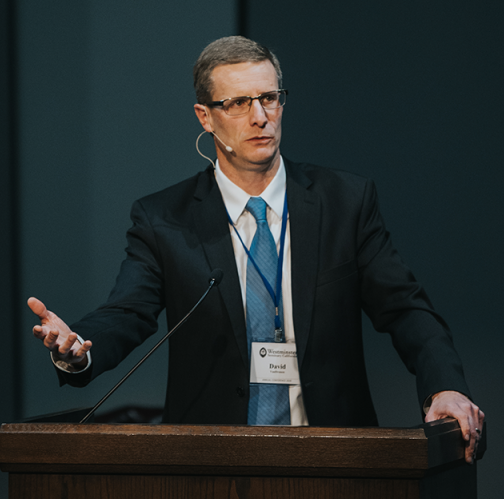
David VanDrunen (PhD, Loyola University Chicago) is Robert B. Strimple Professor of Systematic Theology and Christian Ethics at Westminster Seminary California and a minister of the Orthodox Presbyterian Church. He does much of his current research and writing at the intersection of systematic theology, biblical studies, ethics, and legal and political theory. He was the recipient of the Acton Institute’s Novak Award for 2004, a visiting fellow at the Center for the Study of Law and Religion at Emory University in 2009, and a Henry Luce III Fellow in Theology for 2016-17. He is the author or editor of twelve books, most recently Politics after Christendom: Political Theology in a Fractured World and Aquinas Among the Protestants.
Recent Posts
